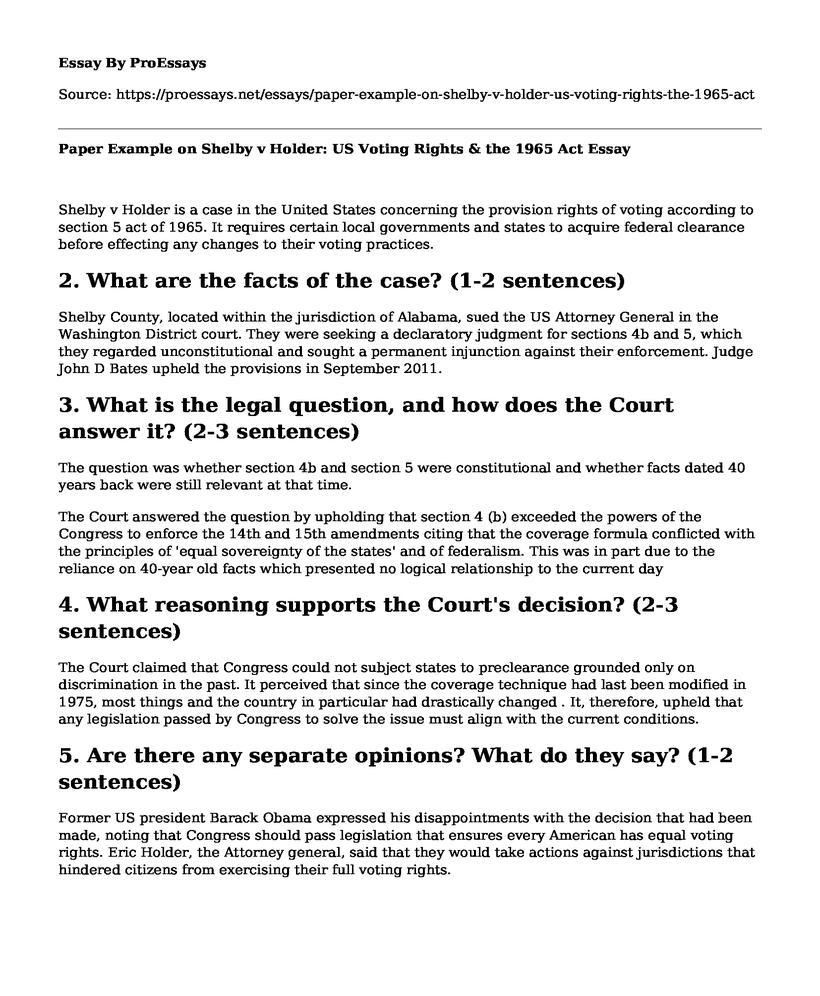Shelby v Holder is a case in the United States concerning the provision rights of voting according to section 5 act of 1965. It requires certain local governments and states to acquire federal clearance before effecting any changes to their voting practices.
2. What are the facts of the case? (1-2 sentences)
Shelby County, located within the jurisdiction of Alabama, sued the US Attorney General in the Washington District court. They were seeking a declaratory judgment for sections 4b and 5, which they regarded unconstitutional and sought a permanent injunction against their enforcement. Judge John D Bates upheld the provisions in September 2011.
3. What is the legal question, and how does the Court answer it? (2-3 sentences)
The question was whether section 4b and section 5 were constitutional and whether facts dated 40 years back were still relevant at that time.
The Court answered the question by upholding that section 4 (b) exceeded the powers of the Congress to enforce the 14th and 15th amendments citing that the coverage formula conflicted with the principles of 'equal sovereignty of the states' and of federalism. This was in part due to the reliance on 40-year old facts which presented no logical relationship to the current day
4. What reasoning supports the Court's decision? (2-3 sentences)
The Court claimed that Congress could not subject states to preclearance grounded only on discrimination in the past. It perceived that since the coverage technique had last been modified in 1975, most things and the country in particular had drastically changed . It, therefore, upheld that any legislation passed by Congress to solve the issue must align with the current conditions.
5. Are there any separate opinions? What do they say? (1-2 sentences)
Former US president Barack Obama expressed his disappointments with the decision that had been made, noting that Congress should pass legislation that ensures every American has equal voting rights. Eric Holder, the Attorney general, said that they would take actions against jurisdictions that hindered citizens from exercising their full voting rights.
6. How does this decision fit with other cases? (2-3 sentences)
This decision is similar to that of the Brown V Board of 1954, where the Court declared that racial segregation in schools was unconstitutional. It also proclaimed the separate educational facilities as "characteristically unequal." In both cases, a significant issue of discrimination against people of color arises (Schoenfeld, 2010).
7. Critical reflection: Does the use of race in Shelby align with or contradict the use/meaning of race in Brown? Be sure to explain both the meaning of race in Brown and Shelby first, and then make an analysis.
In the Shelby case, race is used to identify people of color or other races other than white, while in the Brown case, the race is used to represent black people who were being segregated in public schools (Tussman, & TenBroek 1948). In both cases, the race is a fundamental issue that leads to discrimination on various grounds that is; in voting and the education system.
References
Schoenfeld, H. (2010). Mass incarceration and the paradox of prison conditions litigation. Law & Society Review, 44(34), 731-768.
Tussman, J., & TenBroek, J. (1948). The equal protection of the laws. Calif. L. Rev., 37, 341.
Cite this page
Paper Example on Shelby v Holder: US Voting Rights & the 1965 Act. (2023, May 23). Retrieved from https://proessays.net/essays/paper-example-on-shelby-v-holder-us-voting-rights-the-1965-act
If you are the original author of this essay and no longer wish to have it published on the ProEssays website, please click below to request its removal:
- Essay Sample on Technology on the Border
- Death Penalty Methods Essay
- Black Panther Party Platform - Research Paper
- Personal Liberty Violations Essay Example
- Essay Example on Juvenile Crime: The Urgent Need for More Prisons
- Hustler Magazine v. Falwell: Supreme Court Ruling in Favor of Magazine - Case Study
- Daniel Boone: Offender, Prisoner, HIV-Infected Pedophile - Case Study







